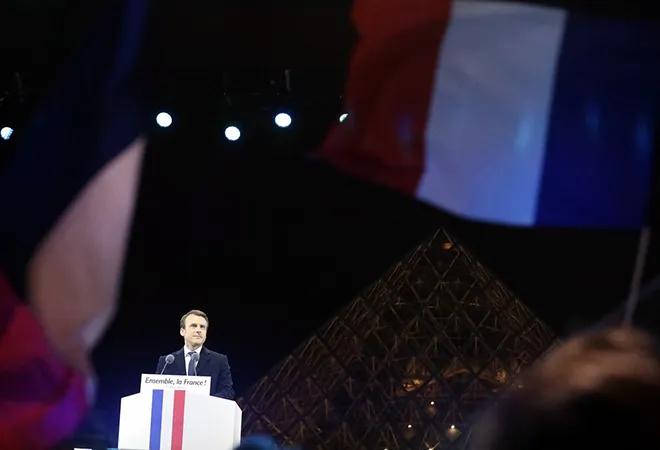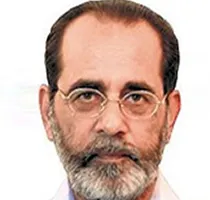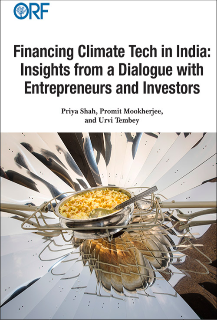The French election results catapulting Emmanuel Macron to the Elysee have been greeted with a palpable sigh of relief all across Europe. A political neophyte who has never held any elected office before, Macron at 39 years is also the youngest President in French history. For once, the polls got it right too. With a 75 percent turnout, Macron scored a decisive victory over Marine Le Pen winning 66 percent of the popular vote compared to Le Pen’s 34 percent. Coming after a rollercoaster election full of twists and turns, Macron will now face the challenge of converting the ‘poetry of the campaign’ into the ‘prose of governance’, of governing a deeply polarised France where at least a third of the population is opposed to his policies.
A meteoric rise
Macron’s rise has been meteoric. At 26, he graduated from the ENA (Ecole Nationale d’Administration), the prestigious and highly competitive school which has trained a majority of French leaders, in politics, civil service, judiciary and business. Opting for a career in finance, he was mentored by Jacques Attali, a well known French economist and social theorist, former adviser to President Mitterand and the first head of the European Bank for Reconstruction and Development. Moving to investment banking with the Rothschild group where he spent five years, Macron returned to government in 2012, as part of President Hollande’s team. After barely two years as Deputy Secretary General at the Elysee, he was appointed the Economy Minister following a cabinet reshuffle. As minister, he enjoyed a good reputation with the business community though his relations with the hard line socialists were often difficult on account of his pro-business leanings. A year later, he had quit the Socialist party and in 2016, he resigned from the cabinet, to launch his own party En Marche! (On the Move), and months later, announce his candidature for the Presidency.
Clearly, Macron had sensed that the traditional parties, the Socialists and the Republicans could not be the vehicle for his candidacy and launching his own party was an audacious move. Fortune however favoured him. Former Prime Minister Francois Fillon had emerged as the front runner after scoring a decisive victory over his rival Alain Juppe for the Republican nomination. Fillon had won on account of his integrity and probity but his campaign suffered a mortal blow when local papers exposed that he had been paying his wife out of government funds by showing her as his political secretary. Though this is not a grave crime in France but a fairly widespread practice where the state provides elected officials funds for employing staff in the constituencies, it tarnished Fillon’s image of Mr. Clean. Benoit Hamon had won the Socialist party nomination by defeating the sitting Prime Minister Manuel Valls by shifting leftwards but was faced with an erosion of his support base from the candidacy of Jean Luc Melenchon. Melenchon was a former Socialist who had quit and set up his movement La France Insoumise (France Unbowed). Hamon’s campaign was also impacted negatively by Socialist President Hollande’s rock bottom poll ratings (5 percent) which made him a one term president.
A brutal campaign
With both the mainstream candidates knocked out, the election campaign took on a sharper edge as both Marine Le Pen (Front National) and Macron sought to project themselves as outsiders. Ironically, Le Pen represented a long standing far right political party which she had successfully rebranded towards economic nationalism from its earlier fascist, anti-Semitic image. This is visible in her 34 percent vote bank, a significant increase from 2002 when her father Jean-Marie Le Pen only managed 18 percent against Jacques Chirac. For Macron, the challenge was greater. He was a product of the very Establishment that he was promising to change. And he was promising to do so not by adopting radical policies but through focussed incremental changes on a centrist platform.
Le Pen sought to exploit the sense of anger and frustration with a platform of anti-immigration and anti-EU. In the TV debate, Macron described her as ‘the high priestess of fear’. Macron presented himself as a liberal, on both economic and social issues. He promised to cut 120000 public sector jobs but also indicated that he would not tinker with the 35 hour week, leaving business to negotiate their own arrangements. He has promised a gradual reduction in corporate taxes from 33 to 25 percent and also committed to a Euro 50 billion public investment plan. He is unabashedly pro-Europe but also pro-reform. He has been supportive of changing the Assad regime in Syria, of sanctions against Russia for Ukraine and increasing defence spending to 2 percent of GDP. Instead of using fear to tap into the mood of anger, he provided optimism and reassurance that French identity was not in danger and French leadership was best restored through education, retraining and technology.
Macron’s victory speech outside the Louvre last night was modest and reflected the realisation that his task ahead was not an easy one. He said that a new page had been turned in French history but added that he wanted it ‘to be a page of renewed hope and trust’. Conscious of the anger and polarisation that has marked this election, Macron eschewed any triumphalism and promised to ‘fight the forces of division that undermine France’. Macron also realises that many who have voted for him have done so because they had to oppose Le Pen; there were also a high number (25 percent) of abstentions. Adding this number to the solid 34 percent vote bank of Le Pen indicates that Macron will have to rely on more than his legendary charm and ability to listen in order to deliver.
Macron’s challenges ahead
The first challenge is the two stage elections for the 577 member Assembly scheduled for 11 and 18 June. Since 2000, Assembly elections have been harmonised with the presidential elections to improve the chances that the newly elected President will be able to get a majority and thus have a Prime Minister of his choice. In the past Republican presidents have seen their agenda stymied by Socialist prime ministers and vice-versa, leading to uneasy co-habitation. Macron’s party will be fighting the Assembly elections for the first time and while he has declared that En Marche! will put up candidates for all seats, at least half of them will be political first timers. Traditionally, the Socialists and the Republicans have dominated the Assembly; even the National Front has only two seats out of 577. Will the disenchantment of the French electorate get reflected in the Assembly elections? Will Macron’s new faces carry conviction and help him expand his centrist base? How far will the moderate Republicans and Socialists cooperate with him in the Assembly?
The first signs towards addressing these questions will come from his government formation exercise. En Marche! which began as a movement and now looks like a promising start-up that has attracted a fair amount of Series A and B funding needs to successfully switch to inducting experienced voices so that it develops the maturity of a post-successful IPO. So far, there has been little speculation about possible cabinet members. Christine Lagarde, currently heading the IMF, Yves Le Drian, currently Defence Minister and Francois Bayrou, former Education Minister and head of the centrist Democratic Movement (MoDem) are among the older politicians whose names have cropped up. An important role is envisaged for Jean Pisani-Ferry who has been responsible for Macron’s economic programme. An engineer turned economist, Pisani-Ferry has decades of economic policy experience and headed the Brussels based think tank Bruegel Forum from 2005-13.
The tides of populism and polarised elections which began with Brexit and led to Trump’s victory have been stemmed in Europe, at least for now. The EU project has been saved and given a reprieve for reform. However the battle for the soul of France is not yet settled. It is a time for relief, the celebrations will come later. And as Andy Borowitz commented – The French have annoyingly retained their traditional right to claim intellectual superiority, particularly over the Americans!
This commentary originally appeared in The Hindu.
The views expressed above belong to the author(s). ORF research and analyses now available on Telegram! Click here to access our curated content — blogs, longforms and interviews.




 PREV
PREV


